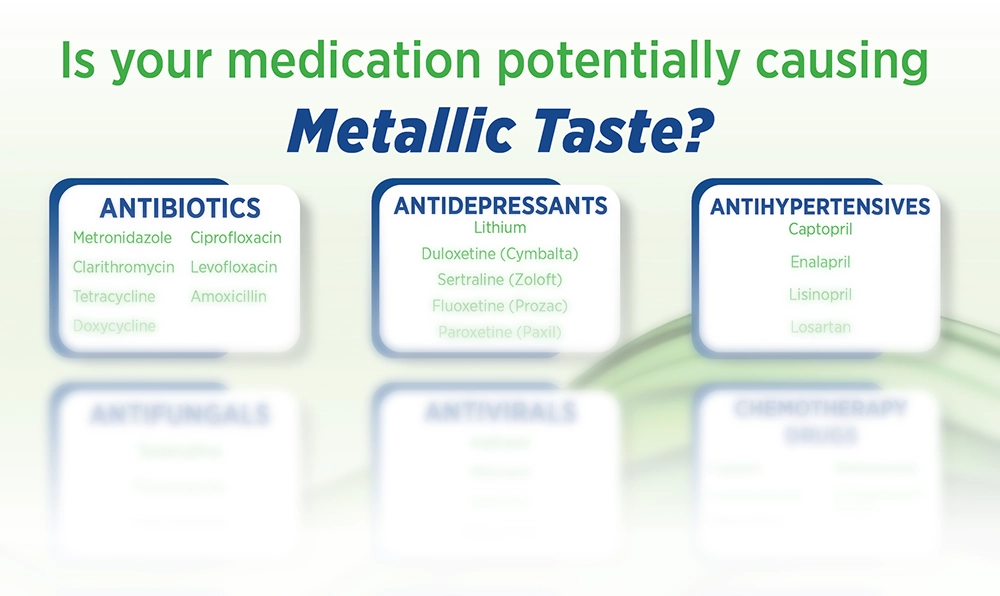


I have been a registered dental hygienist for over a decade. I have had the pleasure of working with amazing patients and educating them on their oral health throughout my career. Recently, I made the conscious decision to branch out within the dental field, choosing to maintain my dental hygiene license, and become a dental educator.
With a passion for oral and systemic health, I have seen clinically the direct impact systemic health can have on oral health. I will be extending my knowledge outside of the dental chair into the world and making an impact on the lives of others. Learn more about Sara, here.
After a surgical procedure, many patients have shared that they experience an altered or metallic taste. This is most likely a temporary result of surgery, or in some severe cases, a permanent side effect of surgery.
This taste disorder is medically termed dysgeusia and is described as a constant metallic, rancid, or bitter taste in the mouth. A metallic taste may be a result of surgery for several reasons, but the use of general anesthetic drugs to perform a surgical procedure is predominant.
In general, surgery is a branch of medicine concerned with diseases or medical conditions that require a manual or operative procedure.
In order for the patient to be comfortable during these surgical procedures, doctors will typically put the patient into a general anesthetic state. This is achieved via potent hypnotics and opioid drugs. Surgical procedures can then be performed without sympathetic nerve damage or memory of the surgical procedure.
Some general anesthetic drugs administered for surgical procedures are meant to reverse the normal functions of areas located within the peripheral and central nervous system where memory and pain receptors reside. Generally, this means they may disrupt the body’s normal functions.
And when there is a disruption of the body’s homeostatic environment, the body’s internal functions may become dysregulated and altered from the anesthetics administered. This is what may cause an altered, metallic taste.
The gustatory complex is located in the central nervous system and is responsible for salivary gland production. As well as signaling taste bud receptors from the mouth to the brain and creating taste sensations as we all know as our sense of taste.
In addition, taste stimulating cells (tastants) are located on the dorsal, lateral, and anterior portions of the tongue, and are excited through salivary stimulation. When tastants are mixed with saliva, they send sensory signals to the brain within the chemosensory system. These activate one of the 5 taste stimulations which are bitter, sweet, salty, sour, and umami.
General anesthetic drugs are commonly neuromuscular receptor agonists and/or antagonists. Anticholinergics are commonly used in conjunction with general anesthesia to assist with surgery. Anticholinergic medications are substances that block the action of the neurotransmitter called acetylcholine at nerve synapses in the central and peripheral nervous system. This inhibits the parasympathetic nervous system by selectively blocking the binding of acetylcholine to its receptor in nerve cells. blocking the binding of acetylcholine to its receptor in nerve cells.
However, anticholinergic medications used temporarily disrupt, and dysregulate the function of the gustatory complex. Any disruptions to the gustatory complex can create metallic taste symptoms as well as dry mouth.

Postoperatively, another contributing factor to altered taste and dry mouth is tracheal tube intubation. These tubes are mostly utilized during surgical procedures by the placement of a flexible plastic tube into the trachea. This is to maintain an open airway or serve as a conduit through which to administer certain drugs.
Postoperative tracheal tube intubation may temporarily decrease salivary production, resulting in dry mouth symptoms. As a result, low salivary production may increase one’s risk for altered taste and dry mouth.
When a patient is coming out of the anesthetic induction, they may experience symptoms of altered taste, metallic taste, or complete loss of taste, as well as dry mouth symptoms. This may happen until the central and peripheral nervous systems resume normal function. It is important to know, it may take some time for the body to metabolize and excrete all general anesthetic medications from the body and return all necessary systems to homeostasis.
Without proper salivary flow, dry mouth symptoms and altered, metallic, or loss of taste may develop.
Having altered taste or metallic taste, especially after surgery, may significantly impact one’s recovery process. This may increase the risk for oral health diseases and infections. Also, this may increase the risk of malnutrition for a patient recovering from surgery, ultimately impacting their state of overall well-being and quality of life.
Some complications of metallic taste are:

For symptomatic metallic taste relief, use MetaQil. MetaQil is a one-of-a-kind oral rinse to alleviate metallic and altered taste. MetaQil is an innovative mouth rinse designed to provide comfort to those who suffer from taste disorders that cause a persistent sensation of bad taste in the mouth. Learn more about MetaQil here.
It is important to address dry mouth and metallic taste symptoms with your doctor or dentist after you have surgery. This ensures you will receive the best post-operative treatment plan that will be essential to your recovery process, as well as your overall health.
Cited Work:
Honing, M., Martini, C., van Velzen, M., Niesters, M., Dahan, A., & Boon, M. (2020). Cholinergic Chemotransmission and Anesthetic Drug Effects at the Carotid Bodies. Molecules, 25(24), 5974. https://doi.org/10.3390/molecules25245974
14.4A: Cholinergic Neurons and Receptors. (2018, July 21). Medicine LibreTexts. https://med.libretexts.org/Bookshelves/Anatomy_and_Physiology/Book%3A_Anatomy_and_Physiology_(Boundless)/14%3A_Autonomic_Nervous_System/14.4%3A_Neurotransmitters_and_Receptors/14.4A%3A_Cholinergic_Neurons_and_Receptors
MetaQil is the #1 solution for symptomatic relief of metallic taste. MetaQil’s scientifically designed formula alleviates metallic taste caused by chemotherapy, GERD, and a variety of medications.
MetaQil gently cools the mouth and provides instant, long-lasting relief from metallic taste symptoms. It has a mild flavor and does not “sting” the mouth like an every-day mouthwash. Regular use of MetaQil can help patients return to healthy eating and adequate nutrient intake.
For best results, use approximately 5 ml (one teaspoon) of MetaQil®, rinse for 30 seconds, and spit out. MetaQil can be used on an as-needed basis. Use alone or after each time you brush your teeth
Important: If you are pregnant or breastfeeding, please consult your physician before using MetaQil. Do not use MetaQil if you are taking any medications that are contraindicated with the product. Please consult with your physician if you have any concerns regarding the use of this product. Keep out of reach of children.
For more information about MetaQil, click here.
